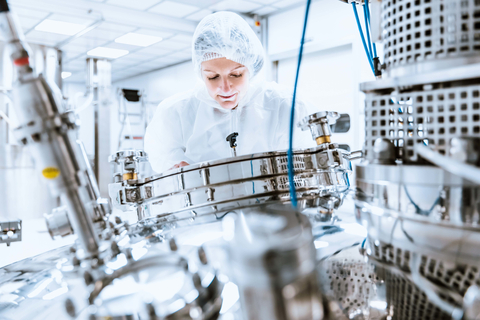MILAN & SAN MATEO, Calif.– Dompé farmaceutici announced today new peer-reviewed data demonstrating that small changes in the SARS-CoV-2 Spike (S)-protein sequence can eliminate its effect in inducing coagulation1. The tendency for the Spike protein to stimulate inflammatory and coagulation has been implicated in coagulopathy observed in the lungs, heart and kidneys of COVID-19 patients with a similar and extremely rare effects observed in a minority of patients who received COVID-19 vaccines.
Data stemmed from the EXSCALATE supercomputing calculation predicted a potential function of Spike (S) as a co-factor for human ERα nuclear signalling. This interaction is mediated by a nuclear receptor co-regulator (NRC) LXD-like motif present on the viral protein S2 subunit, and the activation function 2 (AF-2) region on ERα2. This work builds on other recent studies3,4 showing that coagulopathy is clearly associated with the interaction of the SARS-CoV-2 Spike (S) protein with the human Erα. While circulating estrogens play a protective role by regulating the immune response to infection, modulation of ERα signalling in SARS-CoV-2-infected lung tissue stimulates proinflammatory signals leading to hypertrophy, vasoconstriction, and vessel obstruction.
In the new article the scientists of the italo-american collaboration (encompassing Centro Cardiologico Monzino in Italy and the National Institute on Drug Abuse and the Johns Hopkins School of Medicine in the US) demonstrated that the interaction between the Spike protein and ERα leads to an increase in tissue factor (TF) and the overall pro-coagulation activity in two human endothelial cell lines. The results were further validated by overexpressing S-protein in mice. This pro-coagulative function of Spike in vitro and in vivo, was abolished or strongly reduced by the variants of the Spike proteins carrying mutations in the interaction domain with ERα (as predicted by EXSCALATE).
“The value and benefits of vaccines in countering the COVID-19 pandemic remain unquestionable and overwhelming compared to the risks associated with infection from SARS-CoV-2” underscores Maurizio Pesce, a research Group Leader at the Monzino Cardiology Center in Milan, Italy, and initiator of the study in 2021 together with the leading Silvia Barbieri, another research Group Leader at Monzino, “We hope that our findings will be considered in the development of the next generation of vaccines reducing the residual side effects and risks. Our data also unravel a new function of the viral protein in direct regulation of thrombosis associated factors. This has general implications not only for COVID-19, but for other viral infections altering the coagulation profile of patients”.
“This continuing research is critical to understand the pathogenetic mechanisms associated with SARS-CoV2 infection and causal mechanisms of some rare COVID-19 vaccine side effects,” says Dompé farmaceutici Chief Scientific Officer Marcello Allegretti “Ongoing expanding data is revealing a well-conserved region with the same characteristics of the LXD-like motif present on the viral protein S2 subunit, also in other Coronaviruses. This evidence could open new scenarios in ‘pan-Coronavirus’ vaccination. We are excited to identify a path toward further refinement strategies to enable even more powerful benefits through future vaccination and booster initiatives”.






